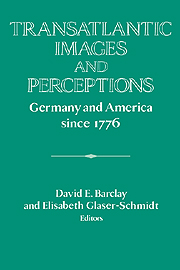Book contents
- Frontmatter
- Introduction
- 1 “Through a Glass, Darkly”: Changing German Ideas of American Freedom, 1776-1806
- 2 “Germans Make Cows and Women Work”: American Perceptions of Germans as Reported in American Travel Books, 1800-1840
- 3 Weary of Germany - Weary of America: Perceptions of the United States in Nineteenth-Century Germany
- 4 “Auch unser Deutschland muss einmal frei werden”: The Immigrant Civil War Experience as a Mirror on Political Conditions in Germany
- 5 Different, But Not Out of This World: German Images of the United States Between Two Wars, 1871-1914
- 6 From Cultureto Kultur : Changing American Perceptions of Imperial Germany, 1870-1914
- 7 The Reciprocal Vision of German and American Intellectuals: Beneath the Shifting Perceptions
- 8 Germany and the United States, 1914-1933: The Mutual Perception of Their Political Systems
- 9 Between Hope and Skepticism: American Views of Germany, 1918-1933
- 10 “Without Concessions to Marxist or Communist Thought”: Fordism in Germany, 1923-1939
- 11 The Continuity of Ambivalence: German Views of America, 1933-1945
- 12 Cultural Migration: Artists and Visual Representation Between Americans and Germans During the 1930s and 1940s
- 13 Representations of Germans and What Germans Represent: American Film Images and Public Perceptions in the Postwar Era
- 14 Chancellor of the Allies? The Significance of the United States in Adenauer's Foreign Policy
- 15 American Policy Toward German Unification: Images and Interests
- 16 Unification Policies and the German Image: Comments on the American Reaction
- Index
2 - “Germans Make Cows and Women Work”: American Perceptions of Germans as Reported in American Travel Books, 1800-1840
Published online by Cambridge University Press: 05 January 2013
- Frontmatter
- Introduction
- 1 “Through a Glass, Darkly”: Changing German Ideas of American Freedom, 1776-1806
- 2 “Germans Make Cows and Women Work”: American Perceptions of Germans as Reported in American Travel Books, 1800-1840
- 3 Weary of Germany - Weary of America: Perceptions of the United States in Nineteenth-Century Germany
- 4 “Auch unser Deutschland muss einmal frei werden”: The Immigrant Civil War Experience as a Mirror on Political Conditions in Germany
- 5 Different, But Not Out of This World: German Images of the United States Between Two Wars, 1871-1914
- 6 From Cultureto Kultur : Changing American Perceptions of Imperial Germany, 1870-1914
- 7 The Reciprocal Vision of German and American Intellectuals: Beneath the Shifting Perceptions
- 8 Germany and the United States, 1914-1933: The Mutual Perception of Their Political Systems
- 9 Between Hope and Skepticism: American Views of Germany, 1918-1933
- 10 “Without Concessions to Marxist or Communist Thought”: Fordism in Germany, 1923-1939
- 11 The Continuity of Ambivalence: German Views of America, 1933-1945
- 12 Cultural Migration: Artists and Visual Representation Between Americans and Germans During the 1930s and 1940s
- 13 Representations of Germans and What Germans Represent: American Film Images and Public Perceptions in the Postwar Era
- 14 Chancellor of the Allies? The Significance of the United States in Adenauer's Foreign Policy
- 15 American Policy Toward German Unification: Images and Interests
- 16 Unification Policies and the German Image: Comments on the American Reaction
- Index
Summary
“In the manners and conversation of these persons, upon the whole, we found a frankness, a cordiality, and good nature truly republican, or which at least I love to consider as such,” wrote John Quincy Adams upon encountering the inhabitants of Saxony during a tour of Germany in 1800. Eighteen years later George Bancroft thought that the people and professors of Göttingen were friendly, too. The first professor he met, “Mr. Benecke,” struck him as “a friendly man,” and he also reported that “Professor Blumenbach and his family . . . are kind to me indeed.” Well over a decade later, the poet and frustrated Bowdoin College professor Henry Wadsworth Longfellow confided to his diary that “Counsellor Bottiger,” the first person he visited upon the recommendation of his friend Washington Irving, had “received me very cordially.”
How does one interpret these three American reactions to Germans? Do they tell us that Germans in the early part of the nineteenth century were invariably friendly to American travelers, to Americans in general, or even to all foreigners? Longfellow's friend Washington Irving thought that such a conclusion would be rash. Upon arriving in Aachen, admittedly out of humor and feeling ill, he wrote to his sister, Sarah Van Wart: “The Germans are full of old customs and usages, which are obsolete in other parts of the world. . . . The people have an antiquated look, particularly the lower orders. The women dress in peculiar costumes.”
- Type
- Chapter
- Information
- Transatlantic Images and PerceptionsGermany and America since 1776, pp. 41 - 64Publisher: Cambridge University PressPrint publication year: 1997
- 1
- Cited by



